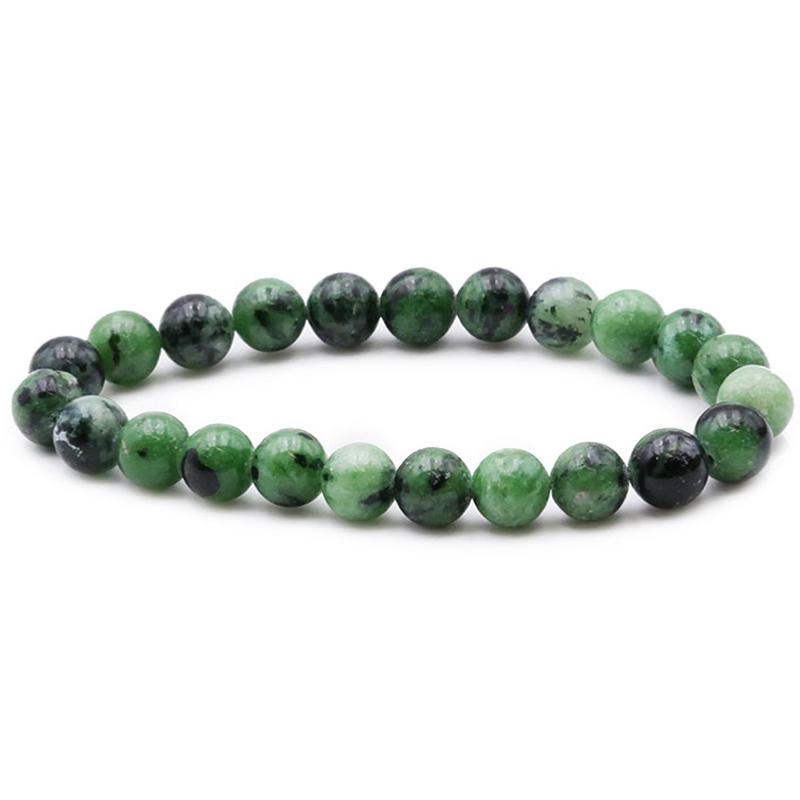Ruby bracelet on zoisite Tanzania A (7-8mm balls)
BRA-RUBZ-01
- Regular price
-
14,90 € - Regular price
-
14,90 € - Sale price
-
14,90 €
Couldn't load pickup availability
Learn more
BRA-RUBZ-01
Origin: Tanzania
Grade: A
Bracelet composed of ruby balls on zoisite of 7-8mm
Patterns and colors may vary from one stone to another.
Zoisite was discovered very recently in the 18th century by the Austrian naturalist and mineralogist Sigmund Zois, Baron Von Edelstein. He sent samples of this stone to the famous German mineralogist, Abraham Gottlob Werner. He named this stone zoisite in homage to the one who discovered it, Sigmund Zois.
The name ruby comes from the Latin “rubeus” meaning red. It is an extremely hard red precious stone, which owes its color to the presence of chromium atoms. The name ruby zoisite comes from the association of these two natural stones: green zoisite and red ruby We can also see black spots, which are in reality inclusions of hornblende, the generic name for a group of silicates.
Ruby on zoisite is sometimes found under the name of anyolite stone. The ruby extracts found in zoisite stone are mostly low quality rubies, which makes its price very accessible.
The Ruby Zoisite stone is a mineral with very few myths or legends associated with it. However, in East African oral traditions, the elders speak of a magical green stone, spotted with black and red. This stone was renowned for providing abundance to hunters and for protecting them from the various dangers encountered such as attacks by wild beasts or bad weather. Some even believed that this stone had the power to make its wearer invisible.
Ruby has a hardness of 9 on the Mohs scale and that of zoisite is between 6 and 6.5 on the same scale. The zoisite ruby owes its other name anyolite to an important deposit discovered in Tanzania in 1954. Its name is taken from the Maasai “anyoli” meaning green. It was mainly used to set jewelry or to be carved into ornamental or religious objects .
Zoisite is composed of aluminum and calcium silicates, ruby inclusions are composed of aluminum oxide and belong to the corundum group.
Today, zoisite ruby is mainly used in the manufacture of jewelry (pendants, bracelets, etc.) or lithotherapy objects. Indeed, it is particularly appreciated in lithotherapy because of its mixture of stones with multiple benefits.
The main deposits are located in Tanzania, Australia, India, Mexico, etc.
In lithotherapy, ruby zoisite is a stone which stimulates vitality and provides motivation. It thus gives the strength to accomplish one's projects and achieve one's objectives. In fact, this stone allows you to become fully aware of your abilities to cope with a workload. It encourages its wearer to no longer let themselves be influenced by the ideas of others, but to follow their own. Thus, it contributes to social and professional success.
A stone of charisma, it engenders the love and admiration of those around you. It restores self-confidence and self-assurance. It facilitates openness towards others and develops feelings of compassion and empathy. It provokes a real interest in others and the desire to help.
This stone is excellent during the loss of a loved one, in the event of a painful divorce or during dismissal. It allows you to find serenity and peace. It is a naturally soothing stone, which calms nervousness and anxiety. It is capable of energizing people lacking energy and calming those who are too agitated.
With its mixture of green and red, ruby zoisite creates balance between power and justice, power and submission, strength and gentleness. It is perfect for people who have functions related to justice.


Ruby bracelet on zoisite Tanzania A (7-8mm balls)
- Regular price
-
14,90 € - Regular price
-
14,90 € - Sale price
-
14,90 €
-
100% SECURE PAYMENT
Paypal, credit card, check, transfer
-
FREE DELIVERY
from 40€ purchase
-
SATISFIED OR REFUNDED
14 days to change your mind
-
CUSTOMER SERVICE AVAILABLE
contact@laboiteacailloux.com
to receive all our offers, good deals and new products from La Boite à Cailloux

